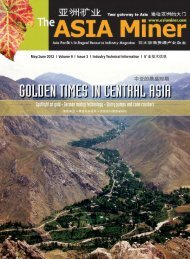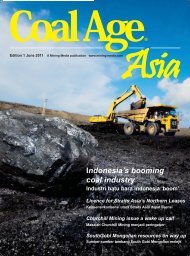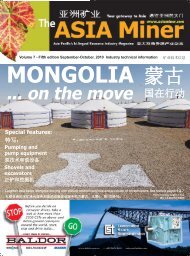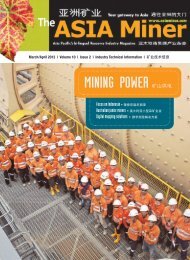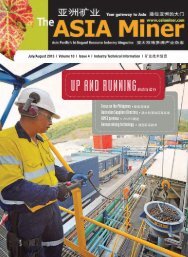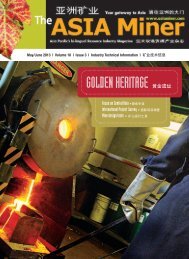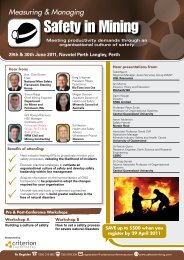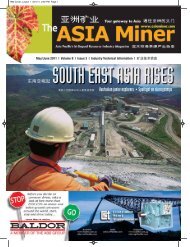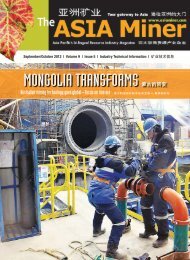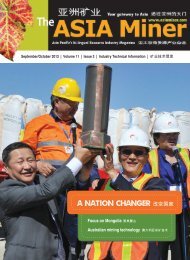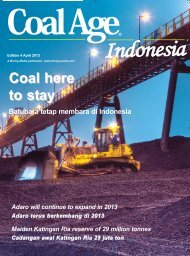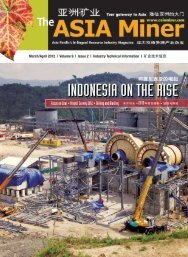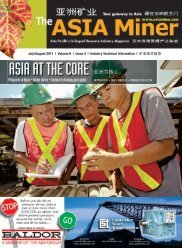MINING WELCOME 欢迎采矿 - The ASIA Miner
MINING WELCOME 欢迎采矿 - The ASIA Miner
MINING WELCOME 欢迎采矿 - The ASIA Miner
You also want an ePaper? Increase the reach of your titles
YUMPU automatically turns print PDFs into web optimized ePapers that Google loves.
Asian Intelligence<br />
Exploration budgets surge to all-time high<br />
THE top challenge during 2011 among senior<br />
mining executives is optimizing production effectiveness,<br />
pushing the previous year’s primary<br />
concern – ensuring workplace safety –<br />
into second position, according to the Mincom<br />
Mining Executive Insights: 2011 survey.<br />
<strong>The</strong> study surveyed high-level executives at<br />
256 mining companies in North America,<br />
Latin America and the Asia Pacific region to<br />
investigate their most pressing concerns, and<br />
where they see opportunities for growth.<br />
When asked to rank their top challenges by<br />
level of urgency, respondents replied: Optimizing/maximizing<br />
production effectiveness<br />
(73%); ensuring workforce safety (53%); recruiting<br />
and retaining a skilled workforce<br />
(47%); managing capital projects (33%); ensuring<br />
different departments work together<br />
(33%); and ensuring equipment operates reliably<br />
and predictably (32%).<br />
Mincom’s executive vice president and<br />
chief strategy officer Jennifer Tejada says,<br />
“Overall, the attitude of the respondents is<br />
positive, with 69% expressing optimism<br />
about their general business outlook.<br />
Not surprisingly, given the growing global<br />
demand for mining products and high commodity<br />
prices, maximizing production is by far<br />
the number-one priority for global mining executives.<br />
We see this trend among many of<br />
Mincom’s mining customers as they work to<br />
achieve productivity improvements, reduce<br />
the impact of production bottlenecks, and<br />
improve integration of processes across the<br />
THE estimated total 2011 budget for nonferrous<br />
metals exploration surged to an all-time<br />
record of $18.2 billion, according to Metals<br />
Economics Group’s (MEG) 22nd edition of<br />
Corporate Exploration Strategies (CES). Despite<br />
increased volatility recently, metals prices,<br />
the primary driver of exploration<br />
spending, remained relatively strong in 2011,<br />
giving confidence to the industry and, as a result,<br />
exploration budgets increased by $6.1<br />
billion, up 50% from 2010. Nonferrous exploration<br />
refers to expenditures related to precious<br />
and base metals, diamonds, uranium<br />
and some industrial minerals but it specifically<br />
excludes iron ore, aluminium, coal, and oil<br />
and gas. Including estimates for the budgets<br />
MEG could not obtain, the 2011 worldwide<br />
exploration budget totals $18.2 billion.<br />
<strong>The</strong> CES study states that most countries<br />
experienced increased exploration investment<br />
in 2011, and explorers demonstrated a<br />
higher tolerance for risk despite additional<br />
concerns and uncertainty about security, policy,<br />
and tenure in many countries. Of the 120<br />
countries for which MEG documented exploration<br />
spending by the industry, those commonly<br />
perceived to be high risk accounted for<br />
23% of the 2011 aggregate exploration total,<br />
up from less than 16% in 2010. <strong>The</strong> study<br />
says that the potential reward often increases<br />
the industry’s appetite for risk during periods<br />
of increased exploration spending, but exploration<br />
in high-risk countries, particularly earlystage<br />
work, is usually the first to be cut when<br />
risk levels or uncertainty increases.<br />
It says the proportion of overall exploration<br />
spending dedicated to early-stage and generative<br />
work has been fairly stable over the past<br />
three years, however, at just a third of overall<br />
allocations it is historically low. <strong>The</strong> decline in<br />
grassroots’ share of spending over the past<br />
decade correlates with the upward trend in<br />
late-stage and mine site budgets, as companies<br />
spent more on late-stage projects to move<br />
them towards production or to make them attractive<br />
for acquisition, and on mine site work<br />
as a less expensive and less risky means of replacing<br />
and adding reserves. However, the<br />
number of large-scale assets advancing to development<br />
has not risen proportionately with<br />
this increased focus on late-stage projects,<br />
contributing to constraints on meaningful production<br />
increases for most metals.<br />
<strong>The</strong> MEG indexed metals price represents a blend of the relative changes in a basket of metals prices weighted by<br />
the percentage of exploration expenditures dedicated to each metal by the industry as reported in MEG’s CES studies.<br />
Relative prices for 2011 are based on the average through September.<br />
Optimizing production effectiveness is top challenge<br />
mining value chain.”<br />
When asked to rank their top three obstacles<br />
to achieving organic growth, respondents<br />
identified the following: Complying with<br />
government regulations (40%); delays in getting<br />
new mines operational (32%); difficulty in<br />
standardizing business processes (22%); inability<br />
to move quickly enough to exploit commodity<br />
prices (21%); and inability to meet<br />
planned production goals (21%).<br />
“Mining companies face additional regulatory<br />
scrutiny as they look to develop new<br />
sites and increase production at existing<br />
ones, leading respondents to once again<br />
identify regulatory compliance as their primary<br />
obstacle to organic growth,” says Jennifer<br />
Tejada.<br />
January/February 2012 | <strong>ASIA</strong> <strong>Miner</strong> | 5



